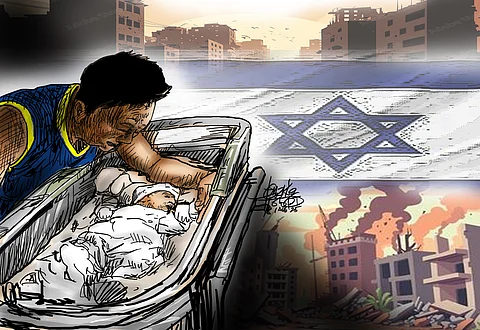
- NEWS
- the EDIT
- COMMENTARY
- BUSINESS
- LIFE
- SHOW
- ACTION
- GLOBAL GOALS
- SNAPS
- DYARYO TIRADA
- MORE

The old man had just pissed himself when the wall blew open. It was 7 October 2023, the day Hamas militants stormed Kibbutz Nir Oz from Gaza.
Jimmy Pacheco was reaching for a clean diaper. Then men in black masks with rifles burst in. His patient Amitai tried to stand. They shot the Jew in the face. Jimmy dropped the diaper and raised both hands.
Jimmy was among the many hostages taken by Hamas. For 49 days, he lived in a maze of damp tunnels, horrified by what war had trapped inside: stifled panic of gagged mouths, the low animal whimper of men too tired to cry, and that final thing that slips out of you when you realize no one’s coming.
His patient was gone, but he kept tending to the wounded, the hungry, terrified. Even under Gaza, a Filipino still served.
He changed diapers, slick with fear. Wiped mouths that bled instead of spoke. Held heads as they seized and stilled. When a man died with his eyes open, Jimmy closed them with his thumbs. Sometimes, the eyes reopened.
He whispered names into ears that didn’t move, fed soup to chins that wouldn’t rise. When there was no food, he chewed toilet paper. When that ran out, he begged to be killed. They never did.
Pacheco was part of the Philippines’ most dependable export. They bathe Europe’s elderly, soothe Japan’s dying, hold Israel’s war-battered hands. It’s a national economy that brings back remittances, and fathers who forget how to hold their children without asking for permission first.
Nearly 30,000 Filipino caregivers work in Israel.
Their contracts don’t mention airstrikes, like those of their counterparts in Syria, Lebanon, Ukraine, Gaza. They were deployed until 7 October forced their government to notice the war.
They expect to serve in homes, not bomb shelters, with few legal protections and no formal path to citizenship.
When rockets fall they’re told to crouch beside the people they’re paid to keep alive.
When Hamas attacked, Filipino workers had no diplomatic leverage, and relied on embassy channels and delayed repatriation support. Their extraction was neither immediate nor guaranteed.
Sometimes they come home in parts. Sometimes they don’t come home at all. Angelyn Aguirre. Loreta Alacre. Mary Grace Cabrera. Paul Vincent Castelvi.
On 15 June, a missile launched from Iran struck Israel. Leah Mosquera, a caregiver from Iloilo, was wounded. She died eventually.
The embassy issued its formal regrets, template condolences, filed and forwarded. The world, as usual, moved on.
Jimmy Pacheco survived and the world called him lucky. The news called him resilient. The two governments called him a hero. They welcomed him like a hero, tight hugs, embassy staff, applause. Then he went home to Guagua. And, if anyone kept track of what happened next, they did it very quietly.
Was there a psychologist at the airport? Are there studies on PTSD in Filipino caregivers? Do we even ask? We train men to be tender abroad, then abandon them when they break quietly, invisibly, at home.
Does it ever visit Jimmy again? The face, rising to speak, then erupting into red? Does the sound of teeth hitting tile wake him before dawn, heart hammering, throat clenched, hands already shaking?
Does he feel the blood spray on his lips? Or hear the wet thud before the screaming starts? Does it play in color? In heat? In sound? In silence?
And when policymakers praise the “heroism,” do they imagine it’s their father’s skull exploding beside a commode? Or wonder what it costs to survive with that image stitched behind your eyes? Is that price too far offshore to count?
Jimmy brought nothing home from Gaza except the will to start over. Not to forget. Never that. But to answer death with birth. Make a child. To, after wiping men waiting to die, change the diapers of someone learning to live.
The baby came into the world howling, not to mourn but to protest. And in that small, insistent cry, he heard the name.
Israela.
A child born not to replace the dead, but to remember them.
